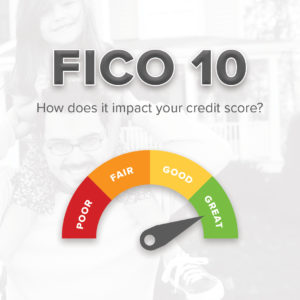Will FICO 10 Impact Your Credit Score?
February 6, 2020
With the introduction of the “FICO Score 10”, some may see their FICO score increase by 20+ points, while others could see theirs drop 20+ points from where they expected it to be.
 According to an interview with Yahoo Money, VP of Product Management at FICO, Dave Shellenberger said, “These are the most predictive scores FICO has developed to date.”
According to an interview with Yahoo Money, VP of Product Management at FICO, Dave Shellenberger said, “These are the most predictive scores FICO has developed to date.”
The new algorithm allows the growth of your debt over time (i.e. with a credit card balance) to now factor into your score, whereas before your score would reflect a more focused look at your current balance as opposed to the 24 month characteristics of that account. It will also put a much heftier negative weight on credit lines like unsecured personal loans and reflect a larger penalty for late payments, lowering your score.
But as the article goes on to explain, the new FICO 10 Score can also help some, noting that “if you run up your credit card balances over Christmas or on a summer vacation, [but] it’s a one-time spike, that won’t hurt your FICO 10 score as much. That’s because the model can look back on historical balances and see this is not a consistent pattern.”
What Can You Do?
While the outline of tips to keep your score up may not seem to differ much from the advice you’ve always been told about credit, it is important to know what you can do and what can affect these increases or dips in your credit due to the new FICO scoring formula.
Pay your bills on time — This seems like a given, but a late payment is going to have a larger impact than it used to with FICO Score 10. A 30, 60 or 90+ day late payment can cost you significant points on your credit score.
Maintain low balances – While this is likely a goal for everyone, everywhere, the new scoring system has honed in on your balance history and your score may be negatively impacted if you’ve been accruing debt (i.e. racking up credit cards and not paying them down) month after month.
Catch up – If you find that you have fallen short in the last year, don’t give up. With the new formula, actively showing intent to catch up could provide a positive curve on your score by depicting that you’re working to improve.
Know Where You Stand
Most importantly, see where you stand so you can evaluate where you can improve as sometimes it can be a very small debt that is bogging down your score and could be an easy fix. Maybe you fell behind on something that is bringing your score down or have a medical bill that you forgot about. Now is the time to check in on your report and make a plan of action to get ahead of your finances for your future.
Sure, the “free score” you get from your credit card company or apps like CreditKarma can give you a general overview and vague scope of numerical score, but it misses detail and lacks in accuracy. If you’ve never seen an official credit report from the “Big 3” (Experian, Equifax and TransUnion), you may not have a true handle on your current situation. When you apply for a mortgage for example, the lender will be pulling from the “Big 3” and your qualifying score will be based on the middle of the three scores so it may not look the same as what you saw on one of those external apps.
At Semper, when you apply we will gladly go over your credit report with you and help you understand and work out any discrepancies you may find on your report. If you’re preparing to buy but aren’t ready to apply yet, check out your free annual credit report* that compiles the three credit bureau results so you can see how you rank and ensure accuracy in your report.
*You are allowed one free credit report every 12 months and will be provided the results of TransUnion, Equifax and Experian. As of 2020, Equifax also offers up to 6 additional reports (just from Equifax) in a 12 month timeframe. Your annual credit report can be requested at https://www.annualcreditreport.com and to inquire about the additional reports from Equifax, visit https://www.equifax.com/personal/credit-report-services/free-credit-reports/
Categories: Credit